

Sleep Deficit: The Performance Killer. Executive Summary Reprint: R0610B Companies today glorify the executive who logs 100-hour workweeks, the road warrior who lives out of a suitcase in multiple time zones, and the negotiator who takes a red-eye to make an 8 AM meeting.

But to Dr. The myth of the eight-hour sleep. Image copyright Other We often worry about lying awake in the middle of the night - but it could be good for you.
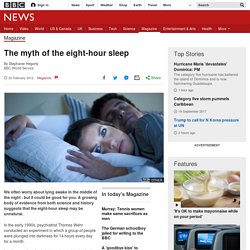
A growing body of evidence from both science and history suggests that the eight-hour sleep may be unnatural. In the early 1990s, psychiatrist Thomas Wehr conducted an experiment in which a group of people were plunged into darkness for 14 hours every day for a month. It took some time for their sleep to regulate but by the fourth week the subjects had settled into a very distinct sleeping pattern.
They slept first for four hours, then woke for one or two hours before falling into a second four-hour sleep. Though sleep scientists were impressed by the study, among the general public the idea that we must sleep for eight consecutive hours persists. In 2001, historian Roger Ekirch of Virginia Tech published a seminal paper, drawn from 16 years of research, revealing a wealth of historical evidence that humans used to sleep in two distinct chunks.
Image copyright bbc. Why morning people rule the world. Evolution has produced a range of humans capable of being alert to danger at every hour of the day.
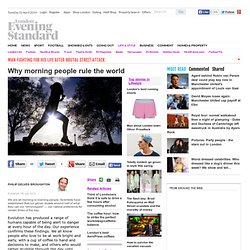
Our experience confirms these findings. We all know people who love to be at work bright and early, with a cup of coffee to hand and decisions to make, and others who would rather stumble through the day until reaching a state of relaxed clarity around dusk, when their minds are purring. The problem is that those with the genetic gift of "morning-ness" tend to be more highly rewarded. The Productivity Myth - The Conversation. By Tony Schwartz | 6:53 AM May 5, 2010 So here’s the paradox: Americans are working 10 percent fewer total hours than they did before the recession, due to layoffs and shortened workdays, but we’re producing nearly as many goods and services as we did back in the full employment days of 2007.
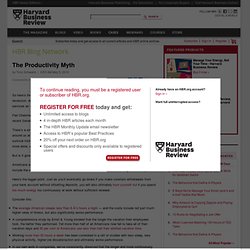
Fed Chairman Ben Bernanke called these gains in productivity “extraordinary” and unforeseen at a recent Senate hearing. There’s a simple, visceral reason for the gains, Mr. Chairman, and it’s called fear. If colleagues around us are being laid off and cut back, we can’t help worrying that our jobs may be next. But is it good news? Americans already put in more hours than workers in any country in the world – and that doesn’t include the uncounted shadow work that technology makes possible after the regular workday ends. Here’s the bigger point. Consider this: Instead, the ethic of more, bigger, faster ultimately generates value that is narrow, shallow and short-term.
George F. Will - How to ruin a child: Too much esteem, too little sleep - washingtonpost.com. Memo to that Massachusetts school where children in physical education classes jump rope without using ropes: Get some ropes.
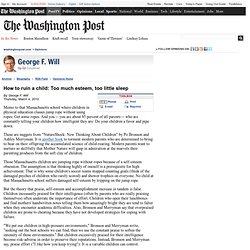
And you -- you are about 85 percent of all parents -- who are constantly telling your children how intelligent they are: Do your children a favor and pipe down. These are nuggets from "NutureShock: New Thinking About Children" by Po Bronson and Ashley Merryman. It is another book to torment modern parents who are determined to bring to bear on their offspring the accumulated science of child-rearing. The National Sleep Research Project - 40 amazing facts about sleep. -The record for the longest period without sleep is 18 days, 21 hours, 40 minutes during a rocking chair marathon. The record holder reported hallucinations, paranoia, blurred vision, slurred speech and memory and concentration lapses. - It's impossible to tell if someone is really awake without close medical supervision.
People can take cat naps with their eyes open without even being aware of it. - Anything less than five minutes to fall asleep at night means you're sleep deprived. The ideal is between 10 and 15 minutes, meaning you're still tired enough to sleep deeply, but not so exhausted you feel sleepy by day. - A new baby typically results in 400-750 hours lost sleep for parents in the first year. Learn at Positively Breastfeeding - When Your Baby Wakes Frequently to Breastfeed or Bottle-feed. "When Your Baby Wakes Frequently to Breastfeed or Bottle-feed" If your baby is waking up every hour or two to breastfeed, bottle-feed, or locate his pacifier, you may be wondering just what it is that causes him to wake up so often.
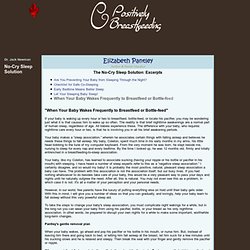
The realiity is that brief nighttime awakenings are a normal part of human sleep, regardless of age. All babies experience these. The difference with your baby, who requires nighttime care every hour or two, is that he is involving you in all his brief awakening periods. Your baby makes a “sleep association,” wherein he associates certain things with falling asleep and believes he needs these things to fall asleep. Your baby, like my Coleton, has learned to associate sucking (having your nipple or his bottle or pacifier in his mouth) with sleeping. Intelligent Life 2006.